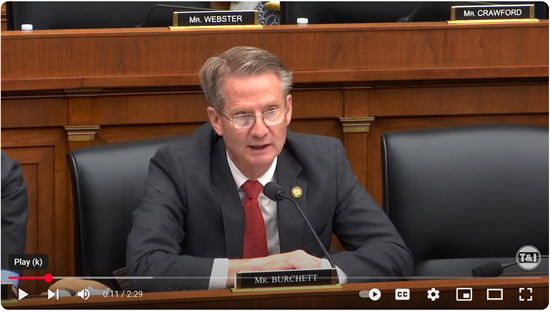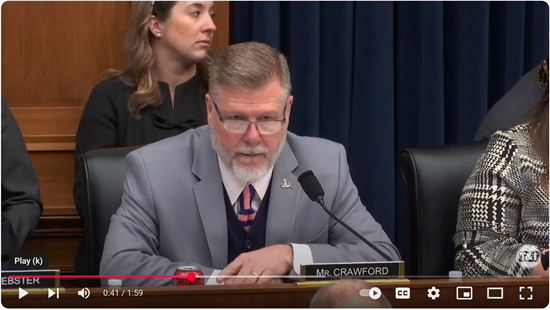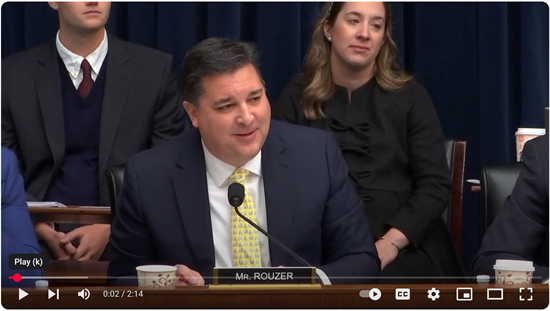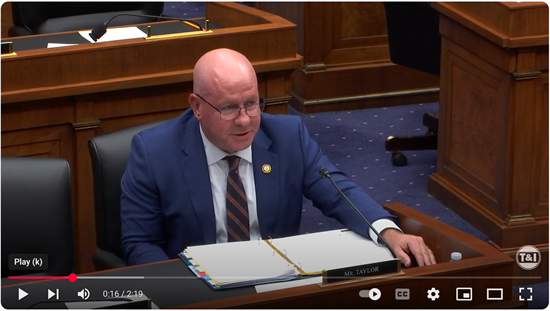Press Releases
T&I’s First Hearing of the Congress Covers the State of U.S. Transportation & Surface Transportation IssuesThe Transportation and Infrastructure Committee today held its first hearing of the 119th Congress focused on the state of U.S. transportation, and many of the issues raised at the hearing will be key factors in the surface transportation reauthorization bill the Committee will develop this Congress. Transportation and Infrastructure Committee Chairman Sam Graves (R-MO) kicked off the hearing by noting that reauthorization, “will be a collaborative process in which the Committee will solicit feedback from both Members and stakeholders. We will consider all input, and Member priorities will drive what’s in the bill this committee produces. Today’s hearing is the kick-off of these discussions. I hope our dialogue will provide a broad overview of the state of the nation’s transportation system, what’s working, where we should be directing investments to fund core infrastructure projects, and the benefits of streamlining processes to allow for faster project completion.” Issues highlighted by witnesses and Committee Republicans included the need to further streamline the infrastructure project delivery process, the importance of core formula highway programs and flexibility for state departments of transportation, and concerns with the feasibility of vehicle electrification efforts. Louisiana Governor Jeff Landry highlighted the importance of ensuring that projects can move forward without unnecessary delays, including full implementation of One Federal Decision provisions. “The mandate is clear, and it is time to reinstate President Trump’s infrastructure policies—you must eliminate regulatory barriers, streamline permitting, and implement the One Federal Decision rule,” Governor Landry said. Seth Schulgen, Vice President of Williams Brother Construction, testifying on behalf of the Associated General Contractors of America, agreed with the need for permitting process reforms: “Infrastructure funding has historically been a major roadblock for infrastructure projects to break ground. Recent investments in infrastructure have largely appeased that concern, but we haven’t seen an influx of major projects breaking ground in part due to environmental review and permitting delays.” Schulgen also highlighted the importance of providing funding in the surface transportation reauthorization through the formula programs: funding that goes directly to states that they then direct according to their specific needs and priorities. “Formula funding allows states to plan and execute projects efficiently. In contrast, discretionary grants require a lengthy process – notice of funding opportunity, application process, DOT review process, project awards etc. – which unnecessarily delay projects breaking ground,” Schulgen said. “There is also an administrative cost to applicants going through the process who often hire consultants to help them navigate this process…. Money that could have been spent investing in infrastructure was spent chasing after discretionary funds run out of Washington. Instead, providing states more funding and flexibility, through the formulas, to determine how best to spend federal funds within their communities would be a more efficient way to maximize infrastructure investments.” Schulgen and Rep. Tim Burchett (R-TN) discussed the importance and efficiency of the formula programs, state flexibility, addressing project delays, and ensuring all highway users pay into the Highway Trust Fund: Highways and Transit Subcommittee Chairman Rick Crawford (R-AR) discussed with Schulgen the positive impacts that project review streamlining initiatives have on executing infrastructure projects: Streamlining the project approval process was also a theme when Railroads, Pipelines, and Hazardous Materials Subcommittee Chairman David Rouzer (R-NC) asked Governor Landry for input about how the United States can maximize the delivery of the energy resources that help power our economy: Witnesses also raised certain concerns related to electric vehicles (EVs). In addition to EVs not paying into the Highway Trust Fund and adding to the Trust Fund’s solvency issues, Home Depot Vice President for Transportation Sarah Galica said, “we are aware of existing and pending state and federal regulations designed to reduce carbon emissions by mandating use of battery-electric trucks. While our carriers are also committed to reducing carbon emissions, there are legitimate concerns about the feasibility of electric trucks as it relates to charging stations and the associated strain on the nation’s electric grid, as well as the readiness and availability of technological upgrades needed to adapt battery-electric vehicles to satisfy deliveries to our stores and to our customers.” Rep. Dave Taylor (R-OH) asked Galica to elaborate about these concerns and the impacts of forced fleet electrification on the cost of consumer goods and companies like Home Depot: Click here for more information from today’s hearing. |










